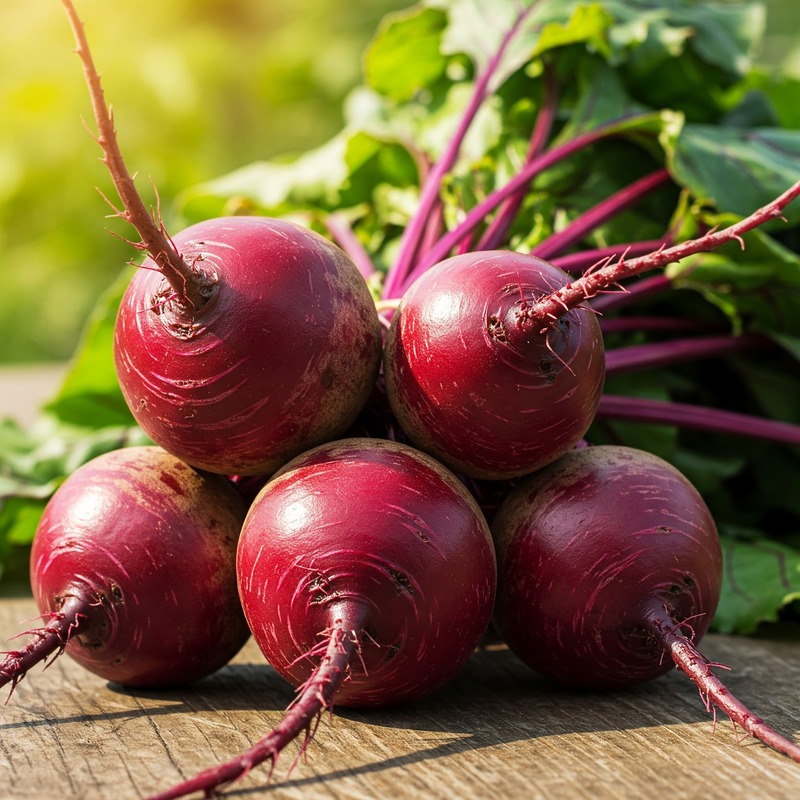Beetroot: Nutrition Facts and Health Benefits make it a superfood packed with essential vitamins, minerals, and antioxidants that support overall well-being. Whether you consume it raw, cooked, or as juice, beetroot offers numerous benefits that can enhance your well-being. Due to its rich nutritional profile and natural compounds, this superfood has gained popularity for promoting heart health, improving exercise performance, and aiding digestion. Beetroot is a good source of nitrates, which are converted to nitric oxide in the body. Nitric oxide helps to relax and widen blood vessels, which can improve blood flow and lower blood pressure.
Nutrition Facts of Beetroot
Beetroot is low in calories yet high in vital nutrients, making it an excellent addition to a healthy diet. A 100-gram serving of raw beetroot contains:
- Calories: 43
- Carbohydrates: 9.6g
- Fiber: 2.8g
- Protein: 1.6g
- Fat: 0.2g
- Folate (Vitamin B9): 20% of the Daily Value (DV)
- Manganese: 14% of the DV
- Potassium: 9% of the DV
- Iron: 4% of the DV
- Vitamin C: 6% of the DV
Beetroot is also rich in nitrates and plant compounds such as betalains, which contribute to its vibrant color and powerful health benefits.
Health Benefits of Beetroot
Beetroot is widely recognized for its health-enhancing properties. Here are some of its top benefits:
1. Supports Heart Health
The nitrates in beetroot help lower blood pressure by relaxing blood vessels and improving circulation. Studies suggest that regular beetroot consumption can reduce the risk of heart disease and stroke.
2. Enhances Athletic Performance
Beetroot juice is a favorite among athletes due to its ability to improve oxygen use and endurance. The nitrates increase nitric oxide levels in the body, which enhances muscle efficiency and stamina.
3. Aids Digestion and Gut Health
Rich in fiber, beetroot promotes a healthy digestive system by supporting gut bacteria and preventing constipation. The fiber content also aids in weight management by promoting fullness.
4. Boosts Brain Function
The nitrates in beetroot improve blood flow to the brain, which may enhance cognitive function and reduce the risk of dementia in older adults.
5. Helps Detoxification
Beetroot contains betalains, which support liver function by helping to flush out toxins and reduce oxidative stress in the body.
6. Anti-inflammatory Effects
Moreover, beetroot contains betalains, pigments that have potent anti-inflammatory properties, potentially reducing chronic inflammation.
How to Consume Beetroot for a Healthy Life
Therefore, to reap these benefits, it’s essential to incorporate beetroot into your diet in various ways:
- Raw: Grate it into salads for a crunchy texture and earthy flavor.
- Juice: Blend fresh beets with other fruits and vegetables for a nutrient-dense drink.
- Cooked: Roast, steam, or boil beetroot to enhance its natural sweetness.
- Smoothies: Add beetroot to smoothies for an antioxidant boost.
- Soups: Make a classic beet soup, such as borscht, for a warming meal.
- Pickled: Preserve beetroot in vinegar and spices for a tangy side dish.
- Beetroot powder: This can be added to many meals and drinks for a nutrient boost.
Conclusion
Beetroot is a powerhouse of nutrition that supports heart health, improves athletic performance, aids digestion, and boosts brain function. By incorporating this vibrant root vegetable into your diet in various ways, you can take advantage of its numerous health benefits. Whether you prefer it raw, cooked, or juiced, adding beetroot to your meals is a simple and delicious way to promote a healthier lifestyle.



